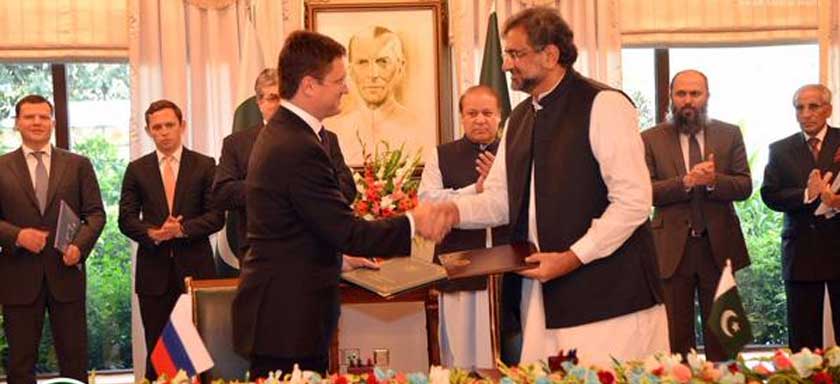Pakistan, Russia sign agreement for construction of North-South gas pipeline

This is the first major project in Pakistan in 40 years in which Russians are involved.
ISLAMABAD (Web Desk / AFP) - Pakistan and Russia have signed an inter-governmental agreement for the construction of 1,100-kilometer (684-mile) gas pipeline, stretching from southern Pakistan’s Karachi to Lahore in the country’s northeast.
Minister for Petroleum and Natural Resources Shahid Khaqan Abbasi and Russian Energy Minister Alexander Novak signed the agreement in Islamabad today (Friday).
Prime Minister Nawaz Sharif also attended the signing ceremony.

The $2 billion project, to be built by Russian state-owned industrial conglomerate Rostec, with a capacity of 12.4bcm per annum will connect liquefied natural gas terminals from the port city of Karachi to Lahore, helping the country deal with crippling energy shortages.
Rostec, run by a close friend of Russian President Vladimir Putin, would finance, own and operate the pipeline for 25 years.
Rostec’s partner in the project will be Inter State Gas Systems (ISGS) controlled by Pakistan. The Pakistani side undertakes to grant the rights to use land plots necessary for the project implementation and carry out research route laying works.
The first phase of the project will be completed by December 2017.
Russia has long been the largest supplier of weaponry to Pakistan s arch rival India, which is the world s top arms buyer. But now Moscow appears to be pivoting towards Islamabad as New Delhi becomes closer allies with Washington.
Russia s ITAR-TASS news agency reported in June that the country had lifted its embargo on arms supplies to Pakistan and was holding talks on supplying Islamabad with combat helicopters.
Prime Minister Nawaz Sharif at the time invited Russian companies to invest in Pakistan, particularly in the energy sector, and benefit from the business-friendly policies of the government.
The South Asian state is desperate for solutions to a long-running power crisis that has sapped economic growth and left its 200 million inhabitants deeply frustrated by incessant electricity cuts.


